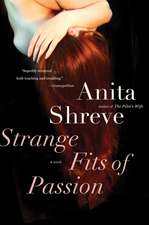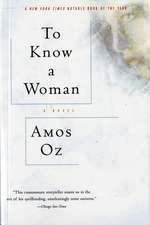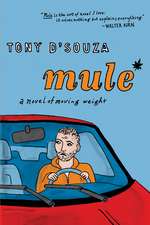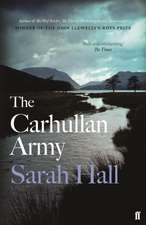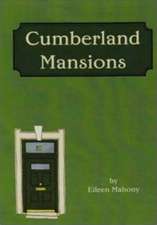The Konkans
Autor Tony D'Souzaen Limba Engleză Paperback – 9 feb 2009
Filled with romance, comedy, and masterful storytelling,The Konkansleaves us surprised by what secrets history may hold for us if only we wonder enough to look.
Preț: 109.47 lei
Nou
20.95€ • 21.95$ • 17.32£
Carte în stoc
Livrare din stoc 04 martie
Specificații
ISBN-10: 015603493X
Pagini: 320
Dimensiuni: 135 x 203 x 19 mm
Greutate: 0.3 kg
Ediția:First Edition
Editura: HarperCollins Publishers
Colecția HarperPerennial
Locul publicării:United States
Recenzii
"Quirky, seductive and funny . . . The author has acquired the arts of a master storyteller, and each little tale nestled in this novel has an intoxicating, fireside charm. Some of the tales are sad, or spooky or bawdy, but all of them seamlessly combine the ancient allure of folklore with a modern, Western literary elegance."--Salon
"It's the quality of vision that makes D'Souza's novel notable and, for a first book, unusual."—The New York Times Book Review
Extras
A long time ago, my uncles bought a pig. I was a few months old at the time. I’d like to say that my uncles bought the pig to herald my birth, but no, it was instead to celebrate the feast of St. Francis Xavier, my namesake and our family’s patron saint, the man who had brought Catholicism and the roots of Konkani, my uncles’ language, to the western coast of India, where they and my father were from, in the early sixteenth century. My uncles had been in America less than a year, my father, four years. My mother was born in Detroit, had spent three years in the Peace Corps in India, where she’d met and married my father.
My uncles were rowdy, debonair young men in the Indian way, not like my father at all. My father was a replica of my grandfather, a police commissioner in Karnataka state, a man as hard as granite with the old Portuguese work ethic as sure in him as his tightly clipped mustache. There was a photo album in our house devoted just to pictures of him, and whether he was in his captain’s uniform with the sash and epaulets and his Lee-Enfield rifle on his shoulder, or whether he was in his rattan chair on the porch of his house in India in a white T-shirt andlungiwrap with one hand raised on his cane, he never cracked a smile. That’s what my father was like, too.
But my uncles did not have the burdens on them that my father did as a firstborn Konkan son, and they liked to drink and dance and joke and chase women. My mother says that the transition to American life was hard for all of them, but the pictures of my uncles from that time don’t support that idea. In picture after picture, my uncles flank my father, smiling like boys up to something, while my father does his best impression of a senator. For two years, my uncles lived in the basement of our house on Nelson Street, and then my father got fed up with them and sold the house, and we left Chicago for the suburbs. My uncles were then on their own.
The one uncle was named Samuel Erasmus, but my father renamed him Sam when he arrived, and the other was named Lesley Wenceslaus, but my father renamed him Les. This was to help them fit in to America. When they got off the plane at O’Hare in 1973, they were both sporting Fu Manchu mustaches that swept the edges of their chins, because an American kung fu film had been all the rage in India the year before, and knowing nothing of America other than that, they’d grown those mustaches to get ready for their immigration to it. No one else wore mustaches like that in their town in southern India, so everyone had known what they were up to and where they were going. According to my uncles, they became very popular with girls.
The first thing my father said to his brothers at the airport, even before “Welcome,” which he never said, was, “Those mustaches have to go.” He stopped at a Walgreens on the way home to buy disposable razors, and before they could even sit down to their first American meal, meat loaf with ketchup and mashed potatoes, which my mother, newly pregnant with me, had prepared for them, they were in the basement bathroom shaving while my father looked on with his arms crossed.
“You don’t know anything here. Do you understand me? You do not know one single thing.”
“Fine, Babu, you are right,” they said together. “Tell us every small thing and we will do it.”
“Be quiet and don’t make a lot of noise.”
“Yes, Babu, that is what we will do.”
The fact was, my father did not want his brothers in America, did not want anything from India following him into his new life here. My father was something of a prig, and though it wasn’t his fault, there it was. My grandfather had spent the family’s money on educating him, and while the rest of the children ran about the streets of Chikmagalur in their bare feet just like the Hindu and Muslim kids did, my father went to a Catholic college in Mangalore on the coast, and then worked for a number of years as a clerk at Standard Chartered Bank in Bombay. He always had the finest shirts and trousers, and had been a member of the British-organized Chikmagalur Boys’ Cricket Club in his youth. My father wanted to be a British gentleman above and beyond all else, and when the opportunity of my mother came along, he took that as a ticket to the United States, the ersatz Britain.
But my uncles were the dust and chaos of real India, and when they wrote on my grandfather’s urging that they’d like to come, my mother snatched the letter from the trash where my father had tossed it, and she filled out the paperwork to sponsor them. This threw my father into a rage. His specialty those days was swearing through clenched teeth and thumping his chest.
“Don’t you respect me, Denise? Didn’t you take a vow to support me in all I do?”
“I don’t remember saying that I would be your slave, Lawrence,” my mother told him, “and besides that, I want mine to be a life of family. When I married you, I married your family. If they want to come over, then it’s our duty to help them. Why should you be the only one in the world who gets to live here?”
My mother was headstrong and brave, with slender arms and long blond hair that she wore in a ponytail. She’d gone to India for a lot of reasons, primarily to get away from her family, and secondly because she had believed in John F. Kennedy’s vision of the world. While there, she had first fallen in love with the country and its people, and later, just before she was scheduled to leave, with my father. My father could read and write and had a salable education. My mother would probably have been happier married to an oxcart driver or laundry washer, but her poor roots had made her practical about the realities of the world, and in marrying my father, she’d brought home with her the one living-and-breathing souvenir of that place who could also get a job in America. Sponsoring over my uncles was done to spite him, a return to what she really loved. Many were the nights that my mother drank and sang and talked Konkani with them while my father glowered in his study, pretending to pore over paperwork for his position as a corporate insurance manager with the multinational Hinton & Thompson, but really grinding his teeth at all that noise, which reminded him in an uncomfortable way of where he was from and who he in fact was.
My mother prepared the basement of the house on Nelson Street for my uncles’ arrival with happiness and cheer. The house had been cut up into rentals before my parents had bought it, and there wasn’t much for her to do, really, but wipe a wet sponge along the sink and toilet, and hang yellow curtains over the half windows to make that basement seem like a home. There was a cement-stairway entrance to the basement apartment from the garden, where my mother grew tomatoes, cucumbers, and peppers in trellised rows, as well as a stairway inside that led to my parents’ kitchen. Just before they came, my father had a workman install a lock on the door at the top of the stairway to the kitchen, and all during their first weeks in the basement, my uncles had to go out through the garden and up onto the porch to ring the bell like visitors if they wanted to see my parents. Then one afternoon my mother opened the front door and saw my uncles shivering in their undershirts in the spring rain, and she made my father give her the key and unlocked the door in the kitchen for good. Whether it was a wise decision or not, from then on the door was open, and my uncles came and went through the house as they pleased.
As men in India, my uncles weren’t used to cooking for themselves, had never really done it, but in their reluctance to let go of their birthplace in this new nation, they began to cook Indian food for themselves in their basement kitchenette. This involved sautéing onions and garlic in oil and browning curry powder and meat in frying pans. The odors soon pervaded the whole house through the opened door and drove my father crazy. The other thing my uncles did down there that pissed my father off was they played Indian music on the turntable my mother had bought for them, and sang and danced and drank to it in their underwear night after night. The noise filled the house, and as they’d lie in bed together with me gestating in my mother’s womb, my father would clench his teeth in the dark and say, “You see, Denise? What did I tell you? Why did we come here if everything will be as it was before? My clothes stink of it, I can feel them looking at me at the office. Why did I come here if everything I hated about it is dancing in my basement?”
Copyright © 2008 by Tony D’Souza
All rights reserved. No part of this publication may be reproduced or transmitted in any form or by any means, electronic or mechanical, including photocopy, recording, or any information storage and retrieval system, without permission in writing from the publisher.
Requests for permission to make copies of any part of the work should be submitted online atwww.harcourt.com/contactor mailed to the following address: Permissions Department, Harcourt, Inc., 6277 Sea Harbor Drive, Orlando, Florida 32887-6777.
Descriere
Francisco D'Sai is a firstborn son of a firstborn son—all the way back to the beginning of a long line of proud Konkans. Known as the "Jews of India," the Konkans kneeled before the Portuguese explorer Vasco da Gama's sword and before Saint Francis Xavier’s cross, abandoned their Hindu traditions, and became Catholics. In 1973 Francisco's Konkan father, Lawrence, and American mother, Denise, move to Chicago, where Francisco is born. His father, who does his best to assimilate into American culture, drinks a lot and speaks little. But his mother, who served in the Peace Corps in India, and his uncle Sam (aka Samuel Erasmus D'Sai) are passionate raconteurs who do their best to preserve the family's Konkan heritage. Friends, allies, and eventually lovers, Sam and Denise feed Francisco’s imagination with proud visions of India and Konkan history.
Filled with romance, comedy, and masterful storytelling, The Konkans leaves us surprised by what secrets history may hold for us if only we wonder enough to look.



